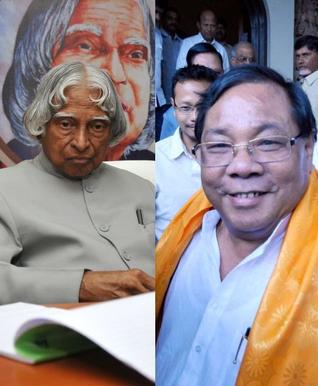 New Delhi, June 17: Ahead of the NDA's crucial meeting on the Presidential election, the BJP is veering round to the view that it should not allow the post to go uncontested.
New Delhi, June 17: Ahead of the NDA's crucial meeting on the Presidential election, the BJP is veering round to the view that it should not allow the post to go uncontested.
There are indications that at the NDA meeting, scheduled here for Sunday morning, the party will vigorously advocate the candidature of the former Lok Sabha Speaker, P.A. Sangma, who has already secured the backing of the AIADMK and the BJD.
Ideally, the BJP would have liked the former President, A.P.J. Abdul Kalam, to enter the fray. Since the NDA leaders have not got his nod so far, it is inclined to throw its weight behind Mr. Sangma.
According to NDA leaders, efforts are still on to persuade Mr. Kalam to contest the election. Janata Party president Subramanian Swamy called on the former President and conveyed the strong desire of the NDA and other parties to see him once again at Rashtrapathi Bhavan.
The BJP is conscious of the reservations of the NDA constituents, like the JD (U), about entering the contest, in which the numbers are heavily stacked in favour of the UPA nominee and Finance Minister Pranab Mukherjee.
Senior BJP leaders are talking to Bihar Chief Minister Nitish Kumar to convince him of the need for putting up a fight against Mr. Mukherjee.
The BJP's ‘Core Group,' which met at the residence of president Nitin Gadkari here, took stock of the developments and decided to leave the final decision to the NDA.
The dominant view at the two-hour meeting — attended by L.K. Advani and Leader of the Opposition in the Lok Sabha Sushma Swaraj — was that it would be in the larger interest of the party to back Mr. Sangma's candidature.
Three factors influenced the outcome of the meeting. At a juncture when the UPA has become very unpopular, the BJP would not like to be seen on the same side as the ruling alliance. In the assessment of the party leaders, backing Mr. Sangma — who says he is contesting in his capacity as a tribal leader — would send a positive signal.
Most important, the party would not like to go against the wishes of the AIADMK and the BJD, which could be potential allies in the 2014 Lok Sabha elections.
The BJP leaders concede that they have their work cut out in view of the clear signal from one of the main constituents of the NDA — JD(U) — that it is in favour of Mr. Mukherjee's candidature.
Shivanand Tiwari, a JD (U) leader considered a confidant of Mr. Nitish Kumar, said that personally he felt “a senior and respected leader like Pranab Mukherjee, who is going into retirement [from active politics], should be given a graceful send-off.”
In another development, Rajya Sabha MP Ram Jethmalani was quoted by a news agency as saying he would contest in the Presidential poll. Though Mr. Mukherjee was his friend, he said, he would oppose his candidature. “I may lose, but I will stand in the election,” he said. “Pranab hasn't revealed the names of black money holders.” He would fight and expose the truth. The BJP leaders said it was his personal view.





Comments
Add new comment